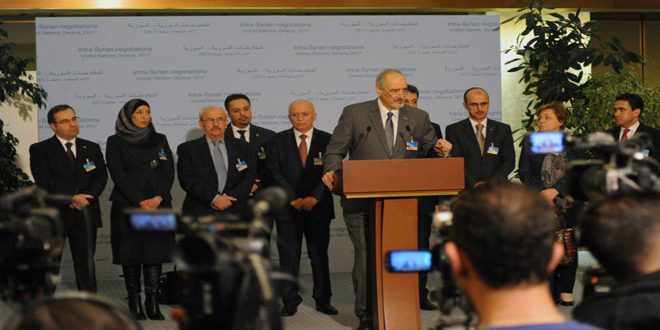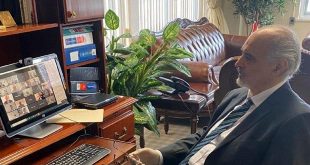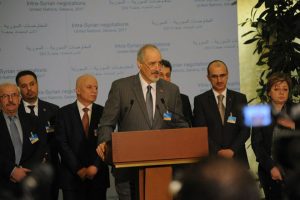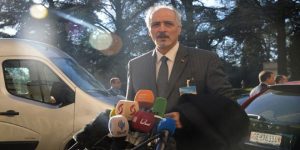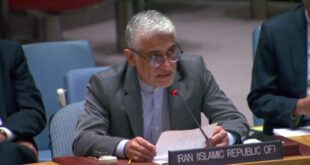Geneva, SANA – Head of the Syrian Arab Republic delegation to the intra-Syrian dialogue in Geneva Bashar al-Jaafari said that the session held with UN Special Envoy for Syria Staffan de Mistura focused on one point only which is prioritizing fighting terrorism.
At a press conference following the talks with de Mistura, al-Jaafari said that the two-and-a-half-hours session focused on one point only which is prioritizing fighting terrorism, and that the delegation asked de Mistrua to issue a statement condemning the terrorist suicide bombings carried out by Jabhat al-Nusra terror organization and its partners in Homs city.
He also said that they asked him to relay the demand for all platforms participating in the Geneva talks to issue clear unambiguous statements regarding what happened in Homs, stressing that any side that refuses to denounce what happened in Homs will be considered a partner in terrorism.
“I said before the session that what happened today will not go unnoticed, and that what happened is a terrorist message for the Geneva talks, a message directed at the Special Envoy, the UN, the so-called international community, and all participants in the Geneva talks. What happened to do cast a shadow over Geneva, therefore the terrorist act in Homs isn’t just a military terrorist act, but also a political terrorist act,” al-Jaafari said
He added that “this is the main reason that drives us to having the article of fighting terrorism as a priority in our agenda for the Geneva talks,” and that the blood of Syrians is precious and those who shed it will pay dearly.
“We made it clear with unambiguous words that we are ready to continue talks until dawn on the basis of the opposition platforms and de Mistura himself issuing a condemnation of the terrorist act in Homs today,” al-Jaafari said, adding “naturally, issuing statements will not bring the victims back to life, but the condemnation will serve as a test for the platforms participating in the Geneva talks as moderate opposition, so that we can find out if these platforms are against terrorism or partners in it.
He noted that he told de Mistura that they are seeking common grounds that open the door to discussing other topics, asking him “how can we talk with anyone about anything if they don’t condemn terrorism,” and telling him that al-Nusra’s goal is to derail the Geneva talks.
“We won’t fall into that trap, which is why we are keen on having partners that reject terrorism like the Syrian people do,” al-Jaafari went on to say, adding that they explained to de Mistura for the hundredth time that it’s not enough to deal with al-Nusra or ISIS or all the other groups affiliated to them that change their names on daily basis like a chameleon changes its color, because fighting terrorism must first go through addressing the sponsors of terrorism politically instead of inviting them to have front-row seats at the opening session.
Al-Jaafari also said that next session was scheduled for Tuesday by de Mistura.
In response to a question on some so-called opposition groups accusing the Syrian state of being responsible for the bombings in Homs, al-Jaafari said that these aren’t opposition; they’re terrorists and partners in terrorism.
Regarding disagreements inside the “Riyadh opposition” delegation regarding handling what happened in Homs, he refrained to comment on what happens among members of one platform or another, saying that all these oppositions are divided among themselves.
Asked whether the Homs bombings are attempts by certain regimes to reshuffle the cards in light of the Syrian Arab Army’s achievements and political achievements, al-Jaafari said “yes, we believe so, and the proof is the statements of the Saudi foreign minister and others,” noting that the statements of al-Jubeir and the Turks about the need for a military solution or so-called “safe zones” show that there are governments involved in prompting al-Nusra to carry out the Homs bombings to derail the Geneva talks, which makes these governments sponsors of terrorism.
Regarding the paper submitted by de Mistura on Friday, al-Jaafari said that this paper hasn’t been discussed because what is currently being discussed is prioritizing fighting terrorism, and as for the conditions of meeting with the opposition, he said that there’s one condition which is having a unified opposition delegation negotiating with the Syrian Arab Republic as a true patriotic partner, adding that this delegation must condemn terrorism and mustn’t be working for a foreign agenda.
On de Mistura’s response to the call for a clear condemnation of the Homs bombings, al-Jaafari said that the bombings send a message from the sponsors of terrorism saying that they don’t want the talks to succeed and that terrorism is stronger than politics, which is why he asked de Mistura to address the sponsors of terrorism directly and to demand they stop supporting terrorism, adding that the Envoy said he will attempt to relay these concepts to the other sides.
In response to a question on whether discussing fighting terrorism with de Mistura constitutes abandoning the Astana track, al-Jaafari expressed belief in the Astana track, but he said that the issue of fighting terrorism can’t be resolved only in Astana but also needs to be addressed in Geneva, New York, and all tracks, stressing that the use of terrorism as a political weapon to pressure political talks mustn’t be permitted, because if the sponsors of terrorism prevail that means they prevailed over international law and chaos will ensue across the world.
On whether ISIS channels Syrian funds to the sponsors of terrorism, he said that ISIS is primarily a terrorist medium, but it also acts as a real-estate and commercial medium working for the benefit of the sponsors of terrorism including the Turkish government, adding “you all remember the aerial photos taken by Russian satellites of hundreds of oil and gas trucks that were stealing oil and gas from Syria and headed to Turkey and from Turkey to Israel. These were ISIS trucks,” adding that there is also the theft and illicit trafficking in Syrian and Iraqi archeological artifacts and that goes through Turkey to European markets.
“We asked a Security Council sub-committee for fighting terrorism to investigate the fate of 32,000 new Toyota cars that were sold from Toyota Company to ISIS. How did these cars reach ISIS? After a year of asking that question, the answer was that Toyota sold these cars to Saudi Arabia, the United Arab Emirates, Qatar, and Turkey,” he said.
Earlier, in a brief statement to the reporters upon the Syrian Arab Republic delegation’s arrival at the UN HQ, al-Jaafari made a comment on the series of terrorist suicide bombings that happened in Homs earlier in the morning and targeted two security centers, claiming the lives of 50 military and civilian persons.
Al-Jaafari said the terrorist bombings in Homs are “a message to Geneva from the patrons of terrorism.”
“We say to everybody ‘the message has been delivered’, and that this crime will not go unnoticed,” he added.
For his part, the UN envoy for Syria said Homs terrorist attacks aim at “spoiling” the Syrian talks in Geneva.
Speaking to the reporters before meeting the delegation of the Syrian Arab Republic, de Mistura said every time there are talks, they are spoilers who want to spoil the process, adding that this was expected.
Shaza/H. Said / Hazem Sabbagh
 Syrian Arab News Agency S A N A
Syrian Arab News Agency S A N A
